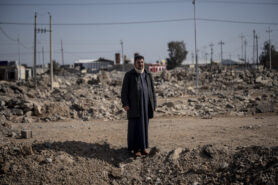This research is concerned with local interpretations of remote warfare as a ‘new way of war’ and the struggle over the meaning of this kind of violence. Taking the US-led international coalition against ISIS in Syria and Iraq as a case study, it explores how the Coalition’s airstrikes are interpreted by Syrians at the receiving end of the violence, who now find themselves as refugees in the Netherlands. Using a Critical Discourse Analytic approach, this research analyses the dynamics between discourse and power through the lens of Foucault’s concept ‘regimes of truth’. Therein, it focuses on the notions of ‘sanctioning’ and ‘status’. This research demonstrates that Syrians in the context of the Netherlands are constrained in contributing to truth construction on the Coalition. This is largely explained by the notion of three powerful discourses that underpin the Coalition’s efforts as an example of remote warfare and that sanction contesting interpretations: the precision discourse, the War on Terror and the discourse of humanitarianism. Moreover, it demonstrates that the status of Syrians in the Netherlands is generally expected to be one of the ‘good victim’, in which they express gratitude for the liberation of ISIS and the protection they enjoy in the Netherlands. Both dynamics show the constraints of Syrians to join in the struggle over the meaning of violence in the context of the Netherlands. Therein, this report contributes to our understanding of local interpretations of remote warfare and the power dynamics that decide what is generally understood as ‘true’ vis-à-vis remote violence.
Source:



